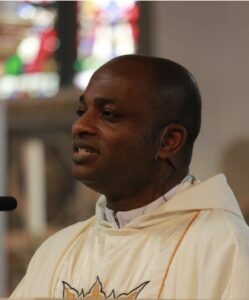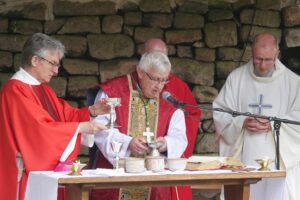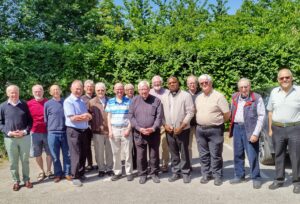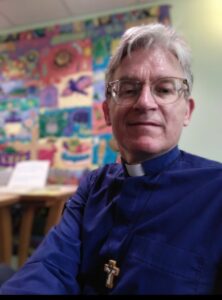Diocese of Hallam Vocations Service
“You did not choose me but I chose you.
And I appointed you to go and bear fruit, fruit that will last.” John 15:16
The Diocese of Hallam Vocations Service seeks to offer encouragement and support to those who wish to discern whether they might have a vocation to become a secular priest in the diocese or who wish to consider joining a religious institute or community.
In the first instance, you should discuss your interest in priesthood or Religious Life with your Parish Priest, with another priest who knows you or with a Religious sister or brother. If the one in whom you confide encourages you to take things further, you should contact the Director of Vocations, supplying a letter of support from the one in whom you have confided. If you have identified a particular Religious Congregation to which you feel attracted, you may wish to contact the Congregation directly. If you are unsure about which Congregation you would like to look at, the Director of Vocations may be able to help.
It is always good practice to subject inspirations that seem to come from God to a formal process of spiritual discernment. The Director of Vocations runs a group called ‘Discerners’ to help those who feel a call to secular priesthood or religious life to reflect on and deal with what they are experiencing.
The group meets monthly at The Catholic Chaplaincy. Each meeting lasts for about 3 hours and includes an informal meal, a short talk with discussion and a period of quiet prayer and adoration in the presence of the Blessed Sacrament. Participants are encouraged to ask a priest or a member of a religious congregation to accompany them on their discernment journey. They also have occasional one to one meetings with the Vocations Director.
Anyone applying to be a candidate for priesthood in the Diocese of Hallam would normally have been a member of ‘Discerners’ for a minimum of 1 year. Most of our candidates come from within the area covered by the diocese. Those who apply from outside the diocese would usually have lived within the diocese for a minimum of 1 year and have participated in ‘Discerners’ meetings.
When a potential candidate, with the support of his accompanist and the Director of Vocations, takes the decision to apply to become a candidate for priesthood in the Diocese of Hallam, the formal application process begins. This includes completing the application form, submitting baptism and confirmation certificates along with the names of 3 referees, undergoing a full medical examination by a qualified practitioner, submitting an up to date DBS (Safeguarding) certificate and participating in a psychological review at a specialist institute. If the candidate has been married, his partner’s death certificate or a decree confirming that the marriage was annulled must also be submitted. The final stage of the application process takes place at the formal interviews with the bishop and other members of his interview panel.
For those who are accepted to become candidates for priesthood in the Diocese, the minimum period to be spent in formation and training is 7 years. The Formation programme begins with a preparatory year known as the Propadeutic Year. The bishops of England & Wales are agreed that this part of the Formation programme should take place at The English College, Valladolid, Spain. The Propadeutic Year empowers candidates to make the transition from secular life and prepares them, upon a positive recommendation from Valladolid, to engage fully with the rest of their seminary Formation programme.
Candidates who are more mature in their experience of life may be considered, at the discretion of the bishop, for a shorter programme of Formation which is undertaken at the Beda College in Rome. Candidates may only be admitted to this programme if they are 30 years of age or more. However, it is important to acknowledge that the programme is not suitable for every candidate who is 30 or more years of age.
The seminary Formation programme is built upon 4 pillars: spiritual, pastoral, academic and human formation. In order for a candidate to proceed to ordination, he must satisfy the seminary by engaging successfully with each of these areas of his Formation towards becoming a priest. For further information about the seminary programme, visit one of the websites listed below.
The minimum age at which ordination may take place is 27 years.
St. Alban’s College, Valladolid, Spain www.sanalbano.org
Allen Hall, London www.allenhall.org.uk
Beda College, Rome, Italy www.bedacollege.com
St. John’s Seminary, Wonersh, Surrey www.wonersh.org
St. Mary’s College, Oscott, Birmingham www.oscott.net
Venerable English College, Rome, Italy www.vecrome.org
Vocations ministry in the Diocese needs your active support spiritually and financially. Here are some of the ways in which you might support and promote vocations:
- Place vocations to priesthood, diaconate and Christian marriage on your list of prayer intentions.
- Form a group to meet regularly at your parish church or in your home to pray for vocations and for those in Formation or Engagement in preparation for the vocation that they are seeking to follow in life.
- Ensure that a prayer for vocations appears regularly in the General Intercessions at Sunday Mass.
- It currently costs a minimum of £250,000 to bring a candidate through Formation to priestly ordination. Please give generously to collections for the Priests’ Training Fund and, if you are making a will, consider making a bequest to the Diocese of Hallam PTF. If you receive an unexpected ‘windfall’, think about making a donation to the Priests’ Training Fund. Perhaps you could form a group to raise money towards the cost of training our priests.
“I am the vine, you are the branches.
Those who abide in me and I in them bear much fruit,
Because apart from me you can do nothing.” John 15:5
Director of Vocations:
Fr Lee Marshall
St Vincent's Mission Hub
Solly Street
Sheffield S1 4DE
Telephone: 07912 290687
Email: [email protected]
Vocations Director: Rev Fr Lee Marshall
Deacons Director: Rev Fr Michael Achile Umameh

Rev Michael Umameh, Director of Deacons
Welcome to the Permanent Diaconate section of the Diocese of Hallam Vocations website.

Diaconal ministry at the Altar at Padley Chapel with Bishop Ralph
“Receive the Gospel of Christ, whose herald you now are. Believe what you read, preach what you believe, and practice what you preach.”
What is a Permanent Deacon?
Since the earliest days of the Church, men have been ordained as Deacon by the Bishop of his diocese and have served the Church in a three-fold ministry:
- The Ministry of Charity
- The Ministry of the Word
- The Ministry of the Altar
A deacon receives the sacrament of Holy Orders and is an ordained minister within the Roman Catholic Church.
Deacons are in a permanent public ministry characterised by a life of service, imitating Christ who came not to be served but to serve.
Each Deacon is appointed by the Bishop to a parish and they serve under the guidance of a parish priest. Deacons proclaim the Gospel and assist at the altar at Mass; they preside at baptisms, weddings and funerals; take Holy Communion to the sick or Viaticum to the dying and fulfil other parish pastoral or administrative duties as the need arises.
As well as having a parish ministry, Deacons may also be assigned to a wide variety of diocesan roles, such as chaplaincy in schools, hospitals, prisons, and universities. Some serve in the area of social justice. There are as many ways to respond to Christ the Servant as there are deacons. Each has his own giftedness, life experiences and way of living out his ministerial calling.
Deacons are from a wide range of professional and educational backgrounds and together they form a diaconal community to support each other in their spiritual and ministerial lives.

Diocese of Hallam Deacon's meeting with Bishop Ralph
Discerning a Vocation
Enquirers should be men (married or single) who are living the Catholic faith in accordance with the teachings of the Church and should normally be between 30 and 55 years of age.
A man considering a vocation as a Permanent Deacon will evidently demonstrate a capacity, beyond their professional and family life, to serve their faith community. This means they will have the support of their parish priest, be actively engaged in the life of their parish, and be involved in works of service, exercising some leadership or charitable role within his community.
After an initial enquiry, aspirants may be invited to submit a formal application and attend a selection conference at Hinsley Hall Pastoral Centre in Leeds, which is usually held in June each year.
Becoming a Deacon
Those recommended, and who are accepted by the Bishop, meet regularly with candidates from the other Northern Dioceses of England and Wales over a number of weekends each year. They reflect on and study scripture, prayer, liturgy and pastoral theology. They meet regularly with a spiritual director and undertake practical pastoral work in a parish. During their first two years of formation, candidates follow an online course in pastoral theology with the Loyola University of Chicago. The workload is managed and presented in a supportive environment as we are conscious that candidates will have existing professional and family responsibilities to meet alongside their studies.
The programme of formation takes four years and is designed to deepen each candidate’s prayer life and his desire to make the Good News of the Gospel known to all. We aim to equip candidates to minister in the Church and wider communities, to encourage others to do the same, and to imitate the Lord Jesus who ‘came not to be served but to serve’ (Mk 10:45).
If you think that the Holy Spirit might be prompting you to respond to God’s call to consider a vocation to the permanent diaconate, then why not email to find out more.
Contact: Rev Deacon Tony Strike – Assistant Director for Diaconal Selection and Formation

Rev Dr Tony Strike, Assistant Director for Selection and Formation
Recommended Reading:
Search online for the BASIC NORMS FOR THE FORMATION OF PERMANENT DEACONS and the DIRECTORY FOR THE MINISTRY AND LIFE OF PERMANENT DEACONS on the VATICAN website, published in 1998
Find us in the map:
Bus services: 52 from the City Centre (Arundel Gate) runs along Attercliffe Common - alight at Stevenson Road stop. Every 7-10 minutes.
Tram: Nearest stops either Woodbourn Road or Attercliffe. Approx 5-10 minutes walk.

